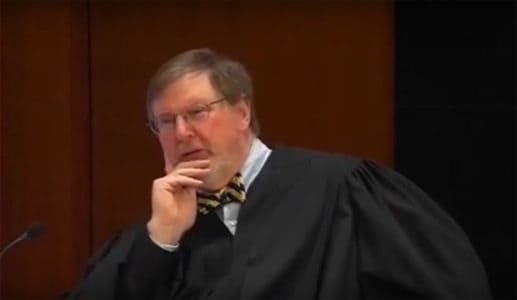
Yesterday, U.S. District Judge James L. Robart succeeded in blocking Donald Trump’s 90-day travel ban by issuing a temporary restraining order on a lawsuit brought forward by Attorney General Bob Ferguson which argued that the order in question broke constitutional guarantees of equal protection under the law.
The ruling applies nationally. Ferguson said in a press release following the ruling that the Constitution prevailed, because “no one is above the law – even the President.”
Needless to say, Trump took the opposite perspective, firing off a number of tweets directed at the “alleged” judge.
The opinion of this so-called judge, which essentially takes law-enforcement away from our country, is ridiculous and will be overturned!
— Donald J. Trump (@realDonaldTrump) February 4, 2017
Interesting that certain Middle-Eastern countries agree with the ban. They know if certain people are allowed in it's death & destruction!
— Donald J. Trump (@realDonaldTrump) February 4, 2017
When a country is no longer able to say who can, and who cannot , come in & out, especially for reasons of safety &.security – big trouble!
— Donald J. Trump (@realDonaldTrump) February 4, 2017
What is our country coming to when a judge can halt a Homeland Security travel ban and anyone, even with bad intentions, can come into U.S.?
— Donald J. Trump (@realDonaldTrump) February 4, 2017
Whether or not the executive order is actually unconstitutional will be decided by higher-level courts. In the meantime, it is worth noting that Robart’s political biases are left of center.
As LifeZette reported: U.S. District Court Judge James Robart, who Friday temporarily curtailed President Donald Trump’s refugee executive order, has something of an activist history on the bench.
Robart, who was nominated to his position by former President George W. Bush in 2004, said the phrase “black lives matter” during a court hearing for a case in August 2016 concerning the Seattle Police Departments potential use of excessive force in a racially charged situation. The Obama administration filed the lawsuit after an investigation concluded the SPD “had engaged in a pattern or practice of excessive force” that “could have a disparate impact on minority communities.”
During a court hearing, Robart became “deeply personal,” as the Seattle Times noted, when he pointed to FBI statistics.
“The importance, to me, of this issue is best demonstrated by the news, which was much reported again today,” Robart said with emotion. “According to FBI statistics, police shootings resulting in deaths involve 41 percent black people despite being only 20 percent of the population living in those cities. Forty-one percent of the casualties, 20 percent of the population. Black lives matter.
Watch federal judge James Robart's #BlackLivesMatter declaration, plus his challenge to Seattle's police union. pic.twitter.com/UDgQl2XCiu
— Ansel Herz (@Ansel) August 23, 2016
Of course, measuring casualties relative to their demographic makeup of the population is inappropriate in this case. Considering that he’s talking about police shootings, he should’ve measured the share of shooting deaths relative to crimes committed (which would’ve contradicted his narrative, of course).


Source: Unbiased America
Robart has also done pro bono legal work for refugees in the past (from Southeast Asia), so it’s needless to say that he has sympathy for refugees, which also could’ve influenced his decision regardless of the actual constitutionality of the executive order.
Either way, we have a system of checks and balances in America for a reason, and it keeps both sides in check. If this is nothing more than a political move by Robart, a higher level court will soon overturn his decision.
Source: Allen West
